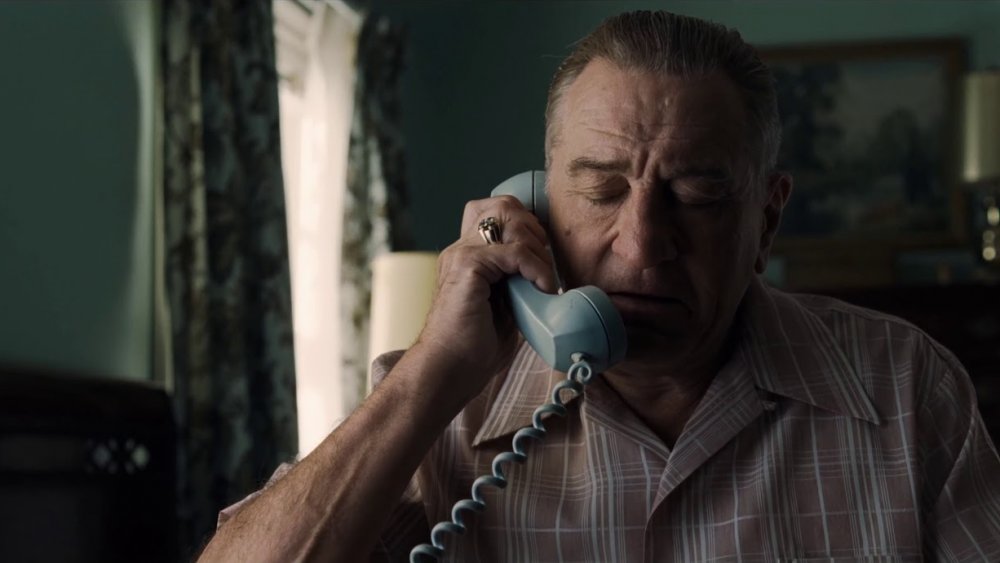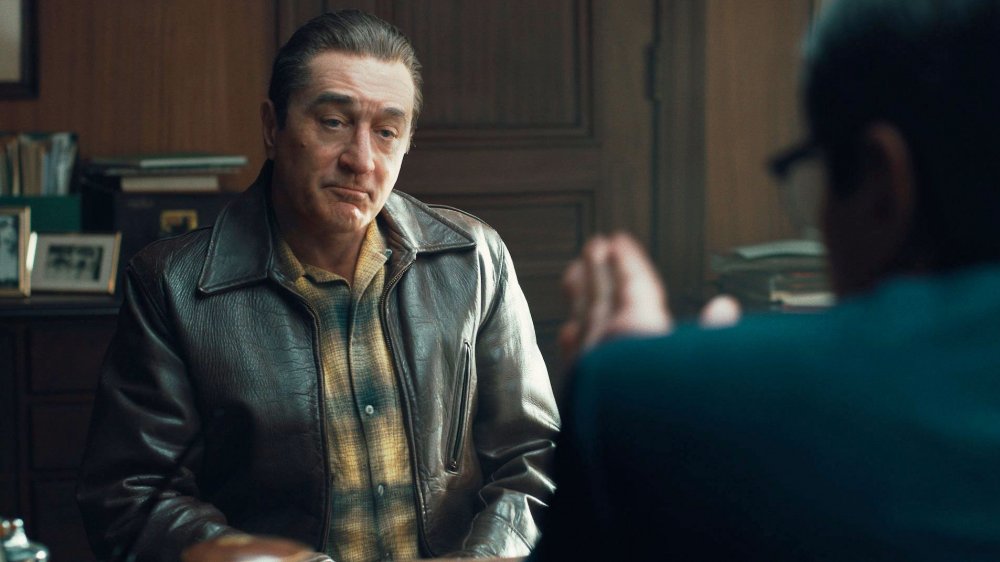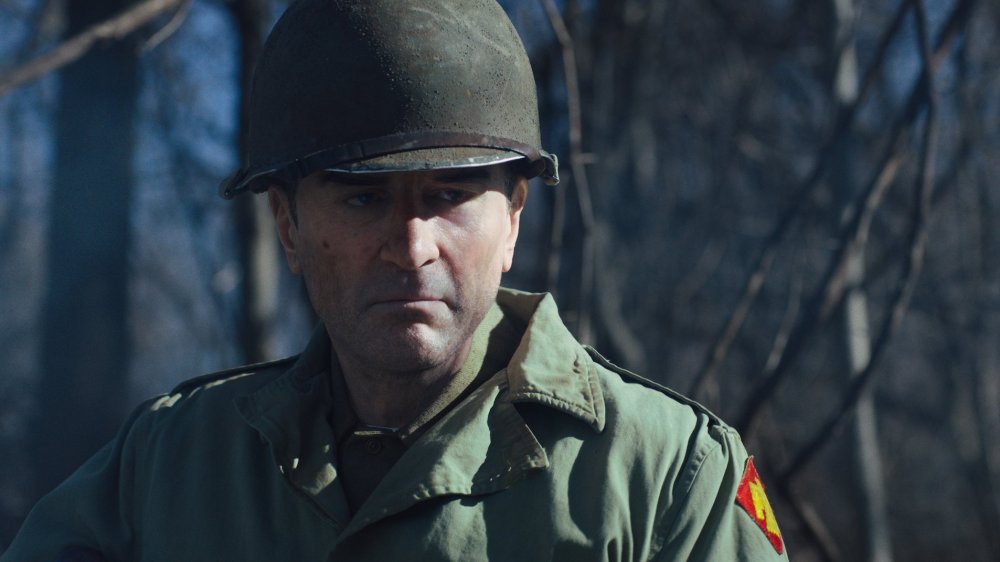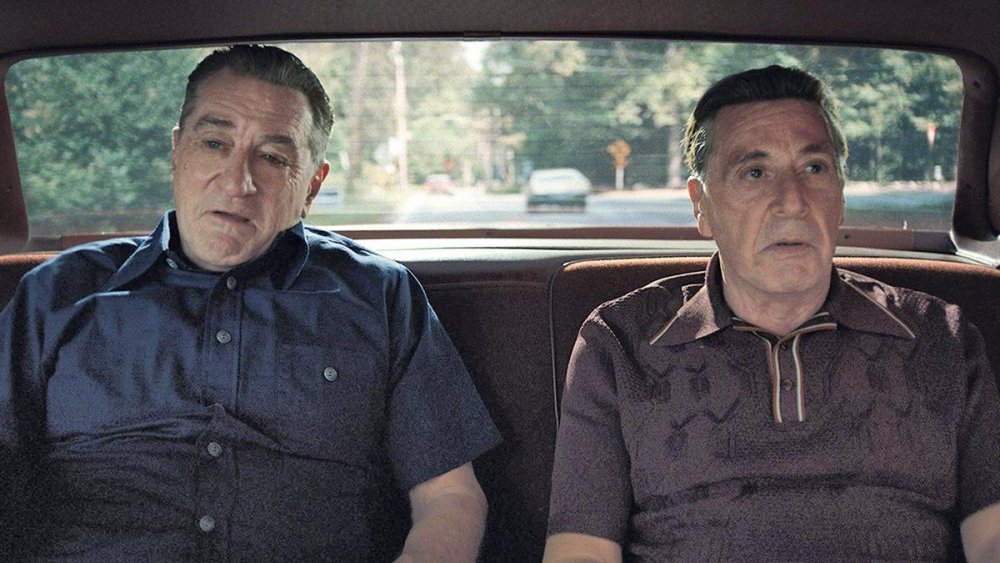The One Irishman Scene That Makes Us Love Robert De Niro Even More
This content was paid for by Netflix and created by Looper.
The most shocking scene in Martin Scorsese's The Irishman comes near the end. Mafia hitman Frank Sheeran, played by screen legend Robert De Niro, lures his best friend, Jimmy Hoffa, into an empty house. Hoffa realizes that something is wrong and heads for the door. Sheeran draws a gun and shoots Hoffa twice, plants the gun on his body, and flees.
It's an incredible moment, but it's not the scene that made us love Robert De Niro. That one comes a few minutes later. As Hoffa's disappearance hits the news, Sheeran decides to call Hoffa's widow, Jo, to make sure she's okay. His goal is to reassure Jo that everything's going to be fine, but as the man who pulled the trigger, he knows that's a lie. Throw in Frank's guilt over the murder, his grief over Hoffa's death, and the pressure of keeping the truth a secret, and he's very close to his breaking point.
The scene that follows has no music, no flashy camera work, and no other actors. It's just De Niro, a telephone, and Jo's hysterical cries. It also happens to be one of the best things that De Niro has ever done. In just under two minutes, the scene gives The Irishman's lead character his most powerful emotional moment, pays tribute to De Niro's long and storied career, and exemplifies what makes De Niro one of the best actors of his — or any — generation. It really must be seen to be believed.
It's how he finds meaning in the spaces between words
De Niro's biggest strength as an actor is the way he can say everything without actually saying anything. His characters mumble and stutter. Often, he talks around his lines instead of reciting them. In some of his most memorable moments, he doesn't speak at all.
However, thanks to De Niro's body language, it's easy to derive meaning from his half-finished words and tangential thoughts. That's one of the reasons De Niro was spot-on casting for a young Vito Corleone in The Godfather Part II: Marlon Brando, who originated the role, had a similar acting style.
The phone call between Frank and Jo is a perfect, if extreme, example. While trying to comfort Jo, Sheeran can barely form coherent sentences. He stutters, can't complete thoughts, and goes off on bizarre tangents. As he speaks, he's so distraught and scattered that he can't even say his own name.
And yet, despite Sheeran's babbling incoherence, it's completely clear what's going on in Frank's mind. Hoffa's death is weighing on him, and while we've seen in the past that Sheeran is an accomplished and skilled liar, the guilt is simply too much for him to bear. It's a breakdown disguised as a well-intentioned, but insincere, attempt to help. It's the kind of scene that only De Niro could've pulled off, and is the perfect example of what makes his acting so unique, and so memorable.
It's how he brings so much more to the scene than what's on the page
Oh, and by the way, that phone call between Frank and Jo? In the original script, it's less than a quarter of a page long. De Niro has two lines: "Jo? It's Frank. Whatever you need, anything I can do, I'm here," and, "It's gonna be all right. I'm sure he's all right."
That's it. There is no reference to mob boss Joseph Bonnano's fake kidnapping. There's no reluctant promise to call Jo again the next day. There's certainly none of the pained, desperate stuttering that makes the scene so powerful.
De Niro has a history of doing this kind of thing. Remember, he's the same guy who improvised the mirror scene in Taxi Driver, birthing one of the most iconic lines of dialogue in history — "You talkin' to me?" — in the process.
Now, we don't know if De Niro came up with Frank's phone call all on his own, but everyone involved with The Irishman has said that quite a bit of improv was involved. It's almost a given that De Niro is the one who transformed this scene from a perfunctory phone call into The Irishman's rawest and most honest moment. Like we said, he's done this kind of thing before.
It's how De Niro's onscreen history plays into Sheehan's meltdown
Robert De Niro has one of the most famous faces in Hollywood. In fact, to a certain extent, that's the entire point of The Irishman, which takes place over multiple decades and uses digital de-aging technology to make De Niro, Pacino, and Joe Pesci look like they're half their ages. It's a magic trick that only works if you know what those actors looked like as young men. Their celebrity is a feature, not a bug.
So when you see a young Frank Sheeran, you're also seeing Taxi Driver's Travis Bickle and Raging Bull's Jake LaMotta. Later, Sheeran bears more than a passing resemblance to Midnight Run's Jack Walsh and Cape Fear's Max Cady. By the time he murders Hoffa, Frank is about 55 years old — and in those scenes, De Niro looks almost exactly like he did in Ronan, Analyze This, and Meet the Parents. You can't help it. Those characters are just all so memorable.
That should be distracting, but it actually works in The Irishman's favor. See, Frank Sheeran has a lot in common with many of De Niro's other characters. Not only is he a gangster, but he's stoic and masculine and exudes an understated cool. We've seen De Niro play a character like this many, many times before.
And yet, we've never seen those characters succumb to guilt and sorrow like Sheeran does here. Goodfellas' James Conway never had to deal with the psychological repercussions of his violent acts. Neither did King of Comedy's Rupert Pupkin, Casino's Sam Rothstein, or plenty of others. Because of the digital de-aging, when Sheeran loses it on the phone, it feels like all of De Niro's past characters have hit the breaking point. In many ways, The Irishman is a celebration of De Niro's onscreen history, and the weight he brings to the screen makes this scene all the more powerful.
It's how Sheeran's grief pays tribute to De Niro's long list of famous collaborators
It's impossible to talk about De Niro's turn in The Irishman without mentioning his director and his co-stars. Including The Irishman, Robert De Niro and Martin Scorsese have made nine movies together. It's De Niro's seventh with Joe Pesci. De Niro and Al Pacino have only worked together four times, and they didn't share any scenes in The Godfather Part II, and only one in Heat.
Still, they're close friends. They both burst into Hollywood around the same time, making a name for themselves in the New Hollywood films that defined cinema in the late '60s and '70s, and quickly became buddies as they navigated their newfound fame together.
The Irishman is a movie about getting older and having to say goodbye to the people you love, and those feelings defined the film behind the scenes, too. Before The Irishman, De Niro and Scorsese hadn't made a movie together since Casino, which came out almost 25 years earlier. Pesci had been retired for close to 20 years when he filmed The Irishman, and reportedly had to be courted pretty hard before he joined the movie. De Niro, age 76, and Pacino, age 80, weren't sure they would ever have a chance to work together again.
When Frank hangs up the phone and bows his head, finally mourning Hoffa, it's hard not to get the sense that De Niro is also saying goodbye to Pacino, Pesci, Scorsese, and all of his other regular collaborators over the years. The Irishman may not be De Niro's last movie, but it's a wonderful tribute to his long, prolific career. Moments like this show exactly why.



